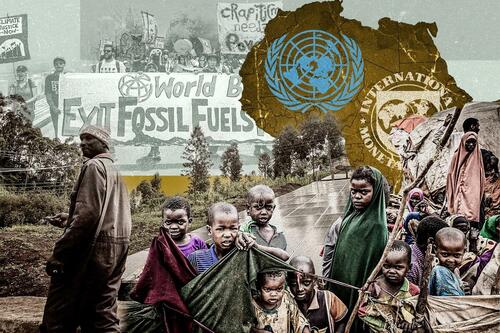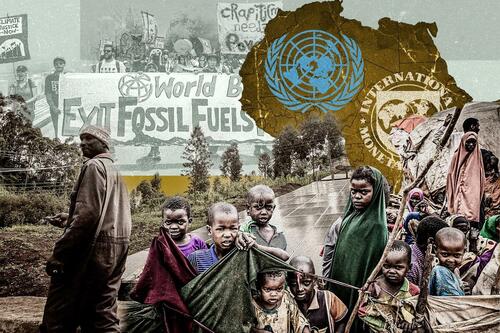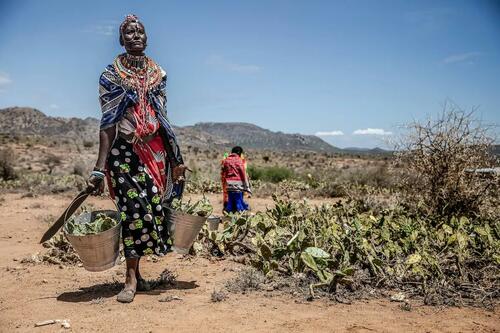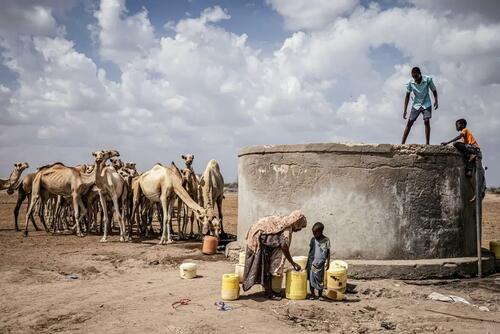
Как изменение климата мешает Африке модернизироваться и добиться процветания
Авторизована Кэти Спенс через The Epoch Times (выделено нами),
Под пылающим кенийским солнцем элегантно женщина трудится на руках и коленях в красновато-коричневой глине, отделяя собирающие сорняки от маленьких, зеленых выстрелов пальцем проса. Женщины голые и босые, и они работают с 8 утра до 5 вечера или 6 вечера ночью. Очистка небольшого поля занимает три дня.
"Комбинированный комбайн может заменить 1000 человек.«Яспер Мачог, инженер-сельскохозяйственник и фермер из Кении, рассказал The Epoch Times. "Мне становится грустно, когда я вижу, как моя мама проходит через просо. У нас есть женщины, стоящие на коленях и выкорчевывающие сорняки через ферму весь день, и это солнечно. Эти машины изменят нашу жизнь. "
 (иллюстрация The Epoch Times, Getty Images, Shutterstock)
(иллюстрация The Epoch Times, Getty Images, Shutterstock)Но такие фермеры, как мистер Мачогу, не могут получить комбинационную поддержку. Даже если бы они могли позволить себе зарплату мясника, которую они зарабатывают на продаже сельскохозяйственных культур, климатическая политика западных стран опережает африканцев в достижении того, что уже есть на Западе - модернизации и процветания.
В ноябре 2023 года для сокращения выбросов углекислого газа от использования ископаемого топлива президент Республики Кения Уильям Руто сократил субсидии на удобрения, топливо и электроэнергию на 2023/2024 финансовый год. Он сделал это по поручению Международного валютного фонда (МВФ), финансового агентства Организации Объединенных Наций (ООН).
"Я из сообщества, где люди используют коровий навоз для удобрения своих ферм.- сказал г-н Мачогу. "И причина этого в том, что в прошлом году правительство Кении решило, что они будут слушать, что им говорит МВФ. Они просили прекратить субсидирование удобрений.
«Вы можете себе представить, как это повлияет на фермеров. Цены на удобрения выросли почти в два раза. У нас здесь очень бедные люди. Так что, если я куплю 20 килограммов для своих ферм, я вынужден получить 10 килограммов сейчас.
«Большинство людей вернулись к использованию коровьего навоза, который не является хорошим азотистым удобрением для их урожая. Вы не можете сравнить мочевину, содержащую 46% азота, с коровьим навозом, только с четырьмя процентами. Это не имеет смысла. "
Г-н Мачогу Саид МВФ и западные страны, которые принимают климатическую политику для Африки, занимаются неоколониализмом, или «климатическим колонизмом». "
И это ничем не отличается от прошлого колониализма, который осуждали либеральные элиты, такие как бывший президент Барак Обама.
«Колониализм перекосил экономику Африки и лишил людей их способности разделять свою судьбу», — сказал Обама, находясь в Эфиопии в 2015 году. "Действительно, процесс либерализации растет. И 50 лет назад, в большой вспышке самоопределения, африканцы радовались, когда иностранные флаги падали, а национальные флаги поднимались. "
Двумя годами ранее, в 2013 году, находясь в Южной Африке, президент Обама предупредил группу молодых африканских лидеров о консенсусе Африки по достижению западного паритета.
 Женщина из Самбуру работает над удалением инновационного завода в Найбунга Верхняя консерватория, округ Лайкипия, Кения, 12 мая 2022 года. (перенаправлено с «Luis Tata/AFP via Getty Images»)
Женщина из Самбуру работает над удалением инновационного завода в Найбунга Верхняя консерватория, округ Лайкипия, Кения, 12 мая 2022 года. (перенаправлено с «Luis Tata/AFP via Getty Images»)«Если каждый поднимет уровень жизни до такой степени, что у каждого будет автомобиль, и у каждого будет кондиционер, у каждого будет большой дом, ну, планета будет расти, если мы не найдем новые способы производства энергии». "
Новый климатический колониализм управляется глобальными организациями, такими как ООН, которая говорит, что Африка должна иметь энергию, но из-за соглашений об изменении климата она должна сосредоточиться на лифте и солнечной энергии.
Кальвин Бейснер, основатель и президент христианского Корнуоллского альянса, сказал, что в настоящее время «наиболее резкая политика» заключается в том, что МВФ, Всемирный банк и такие агенты, как Агентство США по международному развитию, «отказываются от кредитов или других видов жизни для угольных, газовых или нефтяных электростанций в Африке к югу от Сахары и в некоторых частях Азии и Латинской Америки». "
Это частично вредит Африке, - сказал он.
Виджай Джаярадж, научный сотрудник Коалиции CO2, сказал, что он вырос в Индии и стал свидетелем роста индустриализации Индии.
«С точки зрения экономического развития энергия является основополагающим краеугольным камнем», — сказал он.
«Если вы собираетесь нарушить то, как люди получают энергию — где и какое качество энергии они получают — это окажет влияние. Не только в целом, с точки зрения окружающей среды и ВВП, но и на бытовом и индивидуальном уровне, - сказал Джаярадж.
Климатический колониализм
Г-н Мачогу раскритиковал Цели ООН в области устойчивого развития для Африки на 2023 год, которые, по его словам, были разработаны после того, как сотрудники ООН отправились в Африку для изучения проблем, стоящих перед преемственностью. Из этой экспедиции сотрудники ООН вынесли 17 решений. "
"Они сказали, что одной из проблем является изменение климата. Мистер Мачогу сказал. «Для меня это не имеет смысла, потому что я родом из Африки. У нас гораздо большие проблемы — люди спят голодными, очень бедные люди вокруг меня. Я готов к этому больше, чем меня когда-либо будут приветствовать в связи с изменением климата.
«Каждое решение проблем [Африки] сосредоточено вокруг изменения климата. Если вы собираетесь покончить с властью, давайте покончим с ней так, чтобы мы не влияли на наш климат. Если у вас будет чистая вода, давайте сделаем это так, чтобы это не было слишком плохо для климата. "
Он сказал, что современная цивилизация имеет «четыре таблетки цивилизации» — сталь, цемент, пластик и удобрения.
«Без ископаемого топлива мы не сможем произвести эти четыре таблетки цивилизации. Без ископаемого топлива у нас нет энергии. У нас должно быть ископаемое топливо. Вот как Запад побеждает власть. "
Нынешняя официальная позиция Программы ООН по окружающей среде (ЮНЕП) в отношении Африки заключается в том, чтобы помочь ей добиться модернизации, но сделать это в соответствии со строгими экологическими рекомендациями.
В частности, это включает в себя доступ к лифтам и солнечной энергии и отношения с ними, приветствуя страны в непрерывном режиме, чтобы собраться вместе и поговорить о том, что работает, а что нет, «приоритизируя сокращение выбросов от деградации земель» и разрабатывая всеобъемлющую основу для «Развития с низким уровнем выбросов». "
 Верблюды, слабые от улова, стоят за соленой водой, а также мигрируют, чтобы найти пищу возле Мочесы в Найроби, Кения, 9 декабря 2021 года.
Верблюды, слабые от улова, стоят за соленой водой, а также мигрируют, чтобы найти пищу возле Мочесы в Найроби, Кения, 9 декабря 2021 года.Г-н Мачогу сказал, что, с точки зрения непрофессионала, политика ООН сводилась к «отсутствию ископаемого топлива для Африки», что обязательно означает отсутствие экономического прогресса. И наоборот, неограниченный доступ к ископаемому топливу может помочь вывести Африку из власти.
«Позвольте мне говорить за Африку, потому что 60% африканцев полагаются на сельское хозяйство в качестве источника средств к существованию», — сказал он. «Нам нужно ископаемое топливо для сельскохозяйственных машин. Несмотря на то, что ООН, МВФ, Всемирный банк и все эти экологические организации говорят, что солнечная энергия и ветер для Африки, мы не можем электрифицировать сельское хозяйство — если бы мы это сделали, это был бы крошечный процент.
"Сейчас у нас очень низкий доступ к сельскохозяйственной машине. Я думаю, что около четырех или пяти процентов африканцев имеют доступ, который очень низок в таких местах, как 75 процентов Китая, 45 процентов Индии и 95 процентов США. Почти все в сельском хозяйстве США делается машинами. Таким образом, доступ к сельскохозяйственной технике действительно изменит нашу жизнь, потому что это увеличит и расширит наши капиталы. "
В дополнение к потребности в ископаемом топливе для машин и доступу к облигациям для их покупки, г-н Мачогу сказал, что расширение ирригации принесет пользу Африке.
"Африка не совсем зеленая- сказал он. "Есть и другие места, которые очень сухие. Таким образом, одним из простых способов покончить с этим является орошение нашей земли, и мы будем орошать наши земли, используя трубы из ископаемого топлива. "
Подняв желтое пластиковое ведро и пропустив к своим окрестным культурам, Мачоуг сказал, что большинство африканцев получают воду для сельскохозяйственных культур, вытаскивая ее из колодцев. Чем дальше ваш урожай от колодца, тем более трудоемкая и трудоемкая лаборатория.
Наконец, г-н Мачог использовал использование мочевины, удобрения, изготовленного из аммиака и жидкого углекислого газа, в Африке, благодаря внешнему давлению со стороны таких элементов, как МВФ.
«Лично мы используем 40 килограммов азотных удобрений на один гектар нашей земли», — сказал он. «У нас есть другие люди, которые используют 20 килограммов. В других местах, таких как Эфиопия, люди используют 16 кг с гектара.
«Идите в такое место, как США, Запад, который говорит, что Африка не должна иметь доступа к ископаемому топливу, и он использует 120 кг азотных удобрений на гектар. Европа использует 160-170 кг с гектара, Индия — 250 кг с гектара, Китай — 360 кг с гектара.
Читать далее Здесь...
Тайлер Дерден
Солнце, 04/21/2024 - 08:10












![Wyrok: świadczenia z MOPS do 34h na podstawie zaświadczenia lekarza, ale bez orzeczenia o niepełnosprawności [wyrok WSA z 4 czerwca 2025 r.]](https://g.infor.pl/p/_files/38445000/podwyzki-38444589.jpg)



